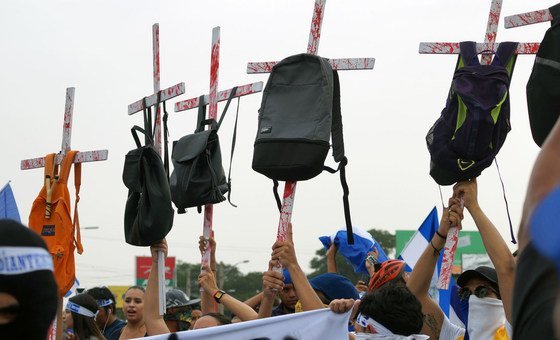
In a new report released on Friday, the three-person group of experts – who are appointed by the UN Human Rights Council – found authorities have used physical and psychological violence, including threats of intimidation, beatings and prolonged solitary confinement against both students and faculty.
Some of these cases could amount to torture and largely involve students and professors who participated in widespread anti-Government protests in 2018 or those who have publicly criticised the Government of President Daniel Ortega.
Universities in Nicaragua have long played a historic role as spaces for social change and resistance, dating back to the 1979 Sandinista Revolution, the experts note.
Consequently, “the Nicaraguan Government has directly targeted universities as part of a widespread repressive campaign, eliminating their autonomy and turning them into centres of political control,” said Jan Simon, who chairs the group, none of whom receive payment for their work and who are not UN staff.
Closures, expulsions
Between 2021 and 2024, at least 37 universities and higher education institutions – most of which are known for supporting social movements – have had their legal status revoked under administrative sanctions.
These closures, the experts underscored, are part of a broader strategy to prevent organised opposition and restrict academic freedom.
Furthermore, since the 2018 protests, it is estimated that hundreds of students and professors have faced arbitrary expulsion or dismissal for their political beliefs, but specific percentages are challenging due to government censorship and data restrictions.
Government reforms and university control
In 2022, the Government introduced reforms through Law 1114, which removed university autonomy, centralising control over academic institutions.
The experts emphasised that this reform effectively placed the government in charge of academic institutions’ finances, administration, and curriculum, undermining independent thought and freedom.
The report also found that in universities which haven’t closed, students and professors deemed critical of the regime now face barriers to obtaining diplomas or transcripts. This restricts not only their educational progression but also future employment opportunities.
Call for international action
The Group of Experts called on the international community to urge the Nicaraguan State to restore university autonomy and guarantee security and freedom of expression in the academic sphere.
“The academic community deserves safe and free spaces to express ideas and contribute to the social development of the country, and these rights must be restored urgently. With these actions the Government is jeopardising the future of the country,” Mr. Simon stressed.
